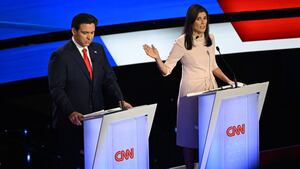Many liberals would claim that Donald Trump is the worst president in American history. In reality, in at least some important ways, he wasn’t even the worst president of their lifetimes.
Take George W. Bush. Trump tried to overturn the 2020 election. Bush and his advisers Karl Rove and James Baker succeeded in overturning the 2000 election. Trump assassinated Iranian general Qasem Soleimani and brought us perilously close to the brink of war with Iran. Bush actually did start long and immensely destructive wars in Iraq and Afghanistan.
But even if he wasn’t always “worse” substantively, that doesn’t mean there was nothing new about Trump.
Someone like Bush was a product of the regular American political establishment and it showed. Trump was a reality television host turned right-wing Twitter troll who convinced many millions of Americans to treat him almost like a cult leader. He’s always had a way of expressing himself that made him sound like a villain in a children’s cartoon. Think of his tweet just weeks before assuming the presidency in 2016 when he wished a “Happy New Year to all including to my many enemies and those who have fought me and lost so badly that they just don’t know what to do. Love!”
That same willingness to say things it seemed impossible to believe would come out of his mouth seems to extend to his lawyers.
In court on Tuesday, Trump’s legal team asserted an incredibly broad interpretation of presidential immunity, arguing that he should be shielded from any legal consequences for his attempts to interfere with the 2020 election. As long as he wasn’t successfully impeached and removed from office for a crime, nothing he did can open him to prosecution. One of his lawyers, in responding to a hypothetical about how far this would go, generated a headline that I stared at for several minutes when I saw it scrolling through The Hill: “Trump team argues assassination of rivals is covered by presidential immunity.”
Yes, Trump’s attorney John Sauer confirmed, even if the President of the United States ordered Seal Team Six to kill one of his political rivals, as long as long as Congress didn’t find out about it in time to impeach and convict him before he left office, the POTUS should be forever immune from prosecution. Really.

Former President Donald Trump speaks to the media following closing arguments at his civil fraud trial on Jan. 11, 2024 in New York City.
Spencer Platt/Getty ImagesI don’t expect the courts to buy it. And again, Trump is an extreme figure willing to say extreme things and authorize his lawyers to make extreme arguments. Even so, I can’t help but think that it says something disturbing about American political culture that we’ve gotten to the point where the legal team of a former president—who, judging by current polls, may become president again after this November’s election—asserts in open court that the president resides in a place so far above the law that even if he assassinated one of his political rivals, he should be immune from prosecution.
We got here as a result of decade after decade of decisions to treat presidents less like executive-level public servants who are subject to the same laws as the rest of us—the way we treat state governors, for example, who often go to jail when they’re found to have committed crimes—and more like kings or emperors. And both parties are to blame.
The Worst Kind of Bipartisanship
Much of the problem traces back to the emergence of an immensely powerful national security state under presidential direction in the aftermath of World War II.
The CIA engaged in covert operations around the world, sometimes including coups and assassinations of elected leaders in other countries, without the knowledge or democratic consent of the American public. The development of nuclear weapons gave the president a power to end human civilization that it would have previously been inconceivable for any individual person to hold. It’s not as if Congress would have time to declare World War III while Soviet ICMBs were headed to the United States. As Gary Wills argues in his book, Bomb Power: The Making of the National Security State, this made it harder and harder to treat the president like a normal human being.
Even so, there have been plenty of decision points since at which the problem was compounded.

President Nixon announces that several thousand American ground troops have entered Cambodia on April 30, 1970.
Bettmann/Getty ImagesCongress let Democratic President Harry Truman and his Republican successor Dwight D. Eisenhower wage war without a congressional declaration in Korea by calling it a “police action.” Democrat Lyndon Johnson and Republican Richard Nixon were allowed to do the same in Vietnam. At the tail end of the Nixon years, the War Powers Act limited this—but created a carveout that essentially allowed presidents to wage war for three months without bothering with any form of congressional authorization, never mind a declaration of war.
All of this elevated the presidency to a position of immense power far beyond what had been previously accepted in the American system, and made it easy to think of presidents as special people who don’t have to worry about the same laws as the rest of us. If the president can wage war on their own say-so and conduct secret semi-wars all over the world when they decide that doing so advances “national security,” they aren’t just another public official. They’re something like an elected emperor.
And the informal precedent that it’s “Good for the Country” to shield presidents from facing legal consequences like the rest of us do when we’re caught breaking laws was set by Gerald Ford’s sweeping pardon of Richard Nixon in 1974. Nixon had illegally spied on his political enemies and covered it up, but he got a “full and unconditional” pardon because putting a former president on trial would be “Bad for the Country.”
After that, what fear would any future president have about seeing the inside of a cell—no matter which laws they broke?
In the 1980s, the Ronald Reagan administration went behind Congress’ back to secretly fund the murderous Contras in Nicaragua—a group whose insurgency against the Sandinista government (even after that government won an internationally supervised democratic election in 1984) involved numerous atrocities against civilians. Reagan himself claimed to have been unaware of the diversion of funds. But back then, belief that the rule of law applied to at least appointed officials in the executive branch was strong enough that many figures in his administration were indicted, including his secretary of defense and his national security adviser. Not to worry, though—they were all pardoned by Reagan’s successor George H.W. Bush. Apparently even holding these officials to account would be “Bad for the Country.”

President Gerald Ford signs a document granting former President Richard Nixon a full pardon, at the White House in Washington on Sept. 8, 1974.
UPI/Bettmann Archive/Getty ImagesIn the 2000s, the second President Bush responded to the 9/11 terrorist attacks by, among other things, “indefinitely detaining” numerous suspected terrorists outside of any kind of legal system. Many were subject to what was euphemistically referred to as “enhanced interrogation” (i.e. torture) by the CIA.
When Barack Obama was running for president in 2008, he denounced these abuses. But almost as soon as he became president, he announced that none of the CIA torturers would face legal consequences. It was important, President Obama said, for the country to “look forward, not backward.”

President George W. Bush speaks to Marines on the 63rd anniversary of the Japanese attack on Pearl Harbor.
David McNew/Getty ImagesI always wondered if, in the years after, anyone being clapped in handcuffs for selling cocaine or holding up a liquor store thought to try their luck with that argument. “What are you doing? Why are you looking backward at crimes I committed in the past?”
Against that background, should Trump’s legal argument be that surprising? After all those decades of bipartisan decisions to entrust presidents with vast, emperor-like powers?
After Ford took a bow for not putting the country through the ordeal of Nixon being subject to the same legal system as the rest of us, and high-ranking Iran-Contra criminals being given the same treatment, and Obama extending it even to individual CIA officers—who stuck the heads of people who hadn’t been convicted of anything in buckets of ice water over and over again before deciding they weren’t guilty of anything after all and quietly letting them go?
It's not hard to see where Trump got the idea that he was an emperor and the peasants shouldn’t be allowed to put him on trial. And if we don’t want some future president to actually use Seal Team 6 to take out a political rival, confident that if anyone finds out he’ll never go to jail anyway, we desperately need to pull back from the brink.









